Introduction
The Rio Grande Valley in Texas neighbors Mexico. As such, it has a rich history as a fluid “border culture” where people travel back and forth across country borders to eat, shop, and visit relatives. The Valley also hosts the largest immigration processing center in the US, along with several other large immigration stations operated by the US Customs and Border Protection agency. With national rhetoric around building a new border wall and changing state immigration enforcement policies, Valley residents are living at the epicenter of the immigrant deportation and forced family separation crisis taking place in the United States.
In 2017 alone, ICE deported an estimated 2,800 residents from the Rio Grande Valley. The approach by ICE to deport everyone without documentation — regardless of their standing in their community — ignores the effects deportations have on the families left behind, and on the broader Valley community.
Many of the recent deportations in the Valley are occurring within the context of a 2017 Texas law, known as Senate Bill 4 or SB4, that in essence forces local law enforcement officers to do the work federal immigration officials are tasked with. Parts of the law are still being debated in the courts and as of the writing of this report officers still have the right to decide whether or not they do federal immigration work. This report finds that segments of this law — and misinformation about its enforcement — are leading to preventable health impacts on children and families in the Rio Grande Valley.
Immigration Stress Is a Determinant of Health
Although health care and individual behaviors undoubtedly influence health and well-being, more than 50% of our health is actually determined by social and environmental conditions,3 or the social determinants of health. These are shaped by environmental, economic, and social policies, which can either help build healthier communities or harm them.4 Immigration stressors — such as living in fear of deportation, being detained for immigration-related reasons, having a family member deported, and experiencing discrimination because of one’s immigration status — can affect an individual’s health in profound ways. Social policies and practices in place in the Rio Grande Valley are causing many families to experience immigration stress, which in turn is impacting the health of entire communities.
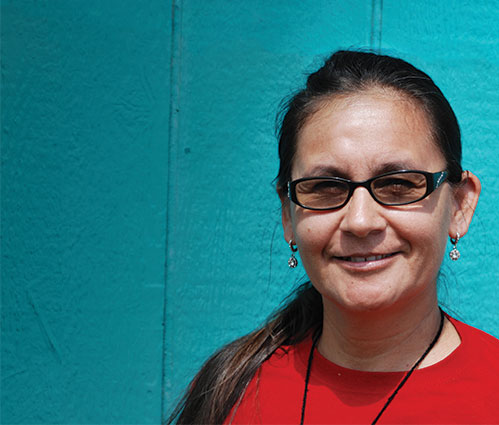
Olga, Rio Grande Valley resident and mother of 2 kids with DACA *
Somos Familias Integradas. We Are Integrated Families.
Many families in the Rio Grande Valley are familias integradas: integrated families. Typically close knit, these families draw strength from their togetherness. For Olga and many others, this family unity is what makes the threat of permanent family separation hang so heavy on their hearts. Families like Olga’s, known as mixed-status families, have a lot at stake if a parent is deported. A parent’s deportation can turn into permanent family separation, since many parents — dedicated to their children’s health and educational aspirations — wouldn’t let their children come with them if they were deported.
This report lifts up how everyday activities, like driving, can result in severe consequences for children and families in the Valley. A minor traffic stop can snowball into the detention or deportation of a Rio Grande Valley community member. We chronicle how current practices around traffic stops, identification (ID) cards, and immigration enforcement are affecting the health and safety of the entire Rio Grande Valley.
These immigration-related stressors are causing children and families — including documented and undocumented people — to experience anxiety, withdrawal, and depression. Individuals under pressure from these factors are changing their behavior in ways that range from benign to life threatening, and the culmination of these experiences can have lifelong consequences to their health, education, and future livelihoods.
About This Report
This report examines what happens to individual and family health when a simple encounter — like a traffic stop — with local law enforcement snowballs into potential detention and/or deportation. We researched the effects on the health of children, parents, and families who live in the Rio Grande Valley when they live in fear of a parent or household loved one being deported, or if they’ve already experienced forced family separation as a result of deportation.
Our methods to measure and analyze the impact of detentions and deportations on children and families in the Rio Grande Valley include:
- A survey of 212 Rio Grande Valley adult residents impacted by the immigration system
- A set of 3 focus groups with Valley individuals impacted by the immigration system (with a total of 31 participants)
- A set of 8 in-depth interviews with medical, education, and business professionals in the Valley
- A review of research on the social and health impacts of immigration policies
- Quantitative estimates of adults and children affected in the Valley
Our approach is to assess this immigration policy issue through a public health lens, to understand its health equity implications in the Rio Grande Valley. At Human Impact Partners, we use the following definition of health equity: “Health equity means that everyone has a fair and just opportunity to be as healthy as possible. To achieve this, we must remove obstacles to health — such as poverty, discrimination, and deep power imbalances — and their consequences, including lack of access to good jobs with fair pay, quality education and housing, safe environments, and health care.”5
Within this frame, we see the rise of traffic stops in the Rio Grande Valley leading to immigration questioning, detention, and deportation creating an obstacle to health equity for Valley communities. As such, we focus our research and related recommendations to better understand this particular set of health inequities.
Appendices A through D include a detailed description of report methods.
Family separations at the border: McAllen in the news
While this report focuses on the health impacts of families already living in the Rio Grande Valley who live in fear of being forced apart, we recognize that the Valley is also dealing with other forms of forced family separation and trauma.
Between April and May 2018, the US government separated nearly 2,000 immigrant children from their parents as they entered the US after crossing the US-Mexico border. Many of these migrant families were fleeing violence in their home countries and trying to reach safety for their children. In the weeks that followed, the entire Rio Grande Valley region was particularly under the media spotlight as many of the people detained were held at facilities in McAllen and Brownsville. As of this report’s publication, nearly 500 of these children are still waiting to be reunified with their families.6
Mixed-Status Family and Other Important Terms
In this report we define a mixed-status family as one that includes: 1) at least one child who is a citizen or has protected status as an immigrant, and 2) at least one parent who is an undocumented immigrant. An estimated 75,000 children in the Rio Grande Valley live in mixed-status families, where one or more of their parents is undocumented. *
There is a growing body of research on the health impacts of deporting a parent of a US-citizen child, including the 2013 report we authored that this document updates and expands upon, and that summarized evidence about the harms to health of detention and deportation in the US.7 Much of the national conversation and research on these health impacts has focused on children living in mixed-status families, because the vast majority of children who live with at least one undocumented parent are themselves US citizens.
Though this report focuses on people in mixed-status families because there is more data for this particular community, we acknowledge the deep and real effects also experienced by people living in families where both children and parents have undocumented status — some of which have been captured through our survey data.
An estimated 775,000 children in the US who are themselves undocumented live with at least one undocumented parent, according to data from 2012.8
At times in this report, we alternate between talking about mixed-status families and specific categories of people grouped by their individual status. We use the categories citizen, protected, and undocumented to describe findings from our surveys. These categories include the following groupings by a person’s status:
- Citizen: a person who was born in the US or is a naturalized citizen
- Protected: a person who has legal permanent residence (LPR) or Deferred Action for Childhood Arrivals (DACA) status
- Undocumented: a person who is an immigrant without protected status
One reason that this report looks at survey results by these 3 categories of status is to acknowledge how the current political climate is reshaping what it means to have citizen or protected status. Even for people who currently have protected status, federal-level discussions on changes to LPR or DACA status cause individuals to live daily with the possibility of losing their protected status — potentially putting them at risk for deportation overnight. Another reason is that research has found that children whose parents are (or can be) directly affected by detention or deportation tend to experience a range of psychological, social, and academic risks more deeply than children of parents with protected status.9
About the term Latinx in this report
We use the word Latinx in this report as a gender-neutral alternative to Latino/a. While it is the language choice in this report, we recognize the nuances of this choice. The US Latinx population is immensely diverse, with people originating from within the United States, US territories, and North, Central, and South America. While the majority of Rio Grande Valley Latinx residents are of Mexican or Mexican-American descent, residents also hail from El Salvador, Guatemala, Honduras, and other Central and South American countries. Latinx sub-groups tend to live in different areas of the US, and may have different cultural practices/norms, different immigration experiences, and varying health status.10
We also recognize that there are other ways to identify besides Latinx or its derivatives, and each carries with it a specific meaning. For example, other ways people who completed our survey identified themselves included Mexicano/a, Hispanic or Hispano/a, Blanco/Hispano or Blanca/Hispana, Indigena, Chicanx, El Salvadorian, or mestizo.
Meet the Rio Grande Valley
The kiddos are going to come back and help out the community in one way or another. And I say that because my parents came from Mexico [without documents].
The Rio Grande Valley is located in the southernmost part of Texas on the US border with Mexico. It encompasses 4 counties — Cameron, Hidalgo, Starr, and Willacy — and is home to roughly 1.3 million people. Deep economic, historical, and cultural connections connect the Valley to both the US and Mexico, with strong business partnerships and family ties spanning both sides of the border. For some members of the community, there isn’t much difference between the Valley on the US side and the Valley on the Mexico side — which is reflected in its shared language, food, music, art, and culture.
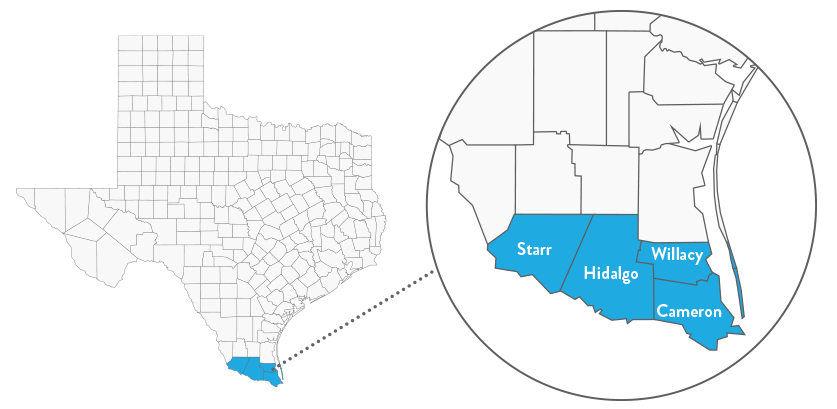
Through property and sales taxes, immigrant families help pay for schools, roads, and other Valley infrastructure. Through their workforce contributions, entrepreneurship, and consumer spending power — the driving force behind economic growth — immigrants contribute to a growing and robust economy in the Valley.
Leaders in business, education, and public health uplift the contributions of immigrant families in the Rio Grande Valley community. Some children of immigrants, like Roel, grow up to be educational professionals and lead top-tier schools. Others start and run small businesses, helping to fuel the local economy.
Valley residents either live in the larger cities like Brownsville, McAllen, Edinburg, and Pharr or in one of thousands of colonias — unincorporated, rural communities beyond the edges of the nearest cities and towns. Its cities are known as great places to live. McAllen, the largest city in Hidalgo County, was ranked among the best places to retire in the US based on the local job market, happiness, housing, health care, and retiree taxes.11 It’s also home to one of the top-grossing malls in the US. And Brownsville was named the city with the safest drivers in America in 2018, with McAllen following close behind in 10th place.12
Access to health care is very limited in some parts of the Valley
While there are many positive aspects to life in the Valley, not all residents have the same access to opportunities, medical care, and social services. According to the federal Health Resources and Services Administration, many people in the Rio Grande Valley are impacted in some way by a shortage of health care services and health care providers.
Both Cameron County and Hidalgo County are designated as Health Professional Shortage Areas in regards to mental health resources and providers, and Starr and Willacy Counties are both designated as High Needs Health Professional Shortage Areas for mental health, dental health, and primary care.13 Additionally, some cities and areas in the Valley are designated as Medically Underserved Areas or Medically Underserved Populations, defined as areas that have “too few primary care providers, high infant mortality, high poverty or a high elderly population.”14
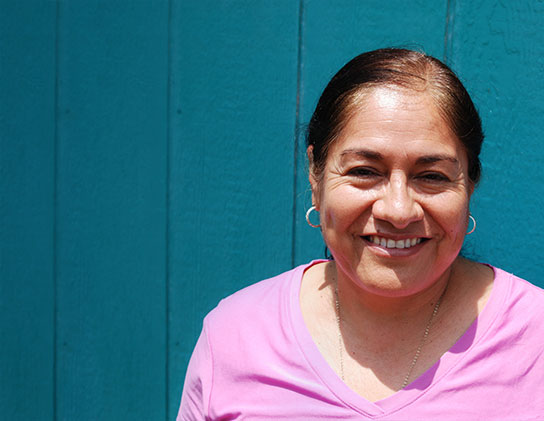
Alberta, Rio Grande Valley resident, and mother of 2 DACA youth
Everyone contributes, regardless of immigration status
In contrast to anti-immigrant and anti-Mexican rhetoric, immigrants often give more than they take — immigrant families use public services such as welfare benefits, Medicaid, WIC, and food stamps less than families with US-born parents.15 Research also finds that DACA-eligible individuals in Texas pay more than $313 million annually in state and local taxes.16 This mirrors the estimated 11 million undocumented immigrants living and working in the United States who contribute more than $11.7 billion in state and local taxes, according to a 2017 report.17

Aidee, Rio Grande Valley college student
Many immigrant and DACA youth in the Valley are just like Aidee: they have grown up going to local schools, have their eye on finishing college, and are part of local faith and community groups. They care about their families, and they contribute to their community. And just like Aidee — who is part of a mixed-status family— many Valley youth are struggling in today’s political atmosphere. Children in mixed-status families worry daily that their siblings or parents might be deported without any warning.
Local Policies Threaten Family Unity
An investigation by the ACLU of Texas found that immigrants are being pulled over for trivial reasons as pretext for checking a person’s identification or to see if they were involved in more serious crimes.18 The ACLU finds that this isn’t a new practice.18 What is new is the role local police are playing in immigration enforcement — and the numbers of Valley residents being handed off to federal immigration officials.18
Three key changes have led to local law enforcement taking on a deeper role in immigration in the Valley:
- Texas limits who can get a driver’s license
- State troopers refer more Valley residents to immigration officials
- State law (SB4) encourages collaboration with immigration officials
Examples of reasons for being pulled over by police in Texas:
- Dark tinted windows
- Improperly placed license plates
- Failure to signal a lane change
- Rolling through a stop sign
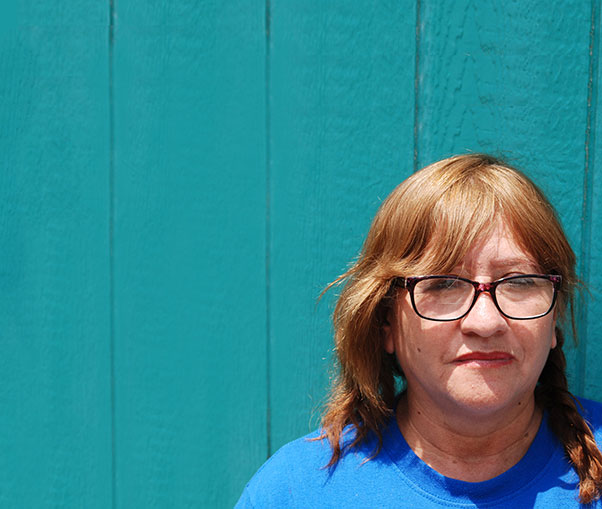
Criss, Rio Grande Valley resident and mother in a mixed-status family
Texas Limits Who Can Get a Driver’s License
In the US, people are required to show a valid form of identification (ID) to do basic things that can support health and everyday life, like renting an apartment or buying a home, cashing a paycheck, enrolling children in school, or getting medical care.19 As the Center for American Progress describes, ensuring that everyone has access to ID benefits entire communities.19
One example of identification that a state can issue is a driver’s license. Yet since 2008, the Texas Department of Motor Vehicles has had a policy mandating that no one can get a driver’s license without showing that they are in the US legally.18 In a region with incredibly limited or nonexistent public transit, this forces many people to drive without a license to go to work or take care of necessary errands, like grocery shopping or picking up children from school.18
Widening access to identification cards
Issuing local ID cards allows undocumented people to access services that may otherwise not be available, and that are critical to health. At least 12 states plus Washington, DC, and Puerto Rico have passed laws to allow undocumented immigrants to get driver’s licenses and driving privileges.20, 21
Research shows that providing universal access to driver’s licenses makes it much more likely that every person behind the wheel of a vehicle has passed a driving test and has auto insurance, it gives US-citizen children greater access to health care and education services, and it helps local service providers, such as law enforcement and health care providers, to provide protection and basic health care services by making it easier to identify the people with whom they interact.19
Preliminary research provides evidence of benefits to offering driver’s licenses. One study found that providing driving privileges to undocumented immigrants in California did not increase the total number of accidents or fatal accidents, but it did reduce the likelihood of hit-and-run accidents, improving traffic safety and reducing costs for California drivers.22
In addition to driver’s licenses, cities are exploring the use of alternative forms of identification. They include, but are not limited to, student identification cards, driver’s licenses issued by the government of another country, consular ID cards and other identification documents issued by the government of another country, association membership cards, and bills/correspondence with the individual’s name and address. Places as varied as Cincinnati, Ohio; Kalamazoo, Michigan; Greensboro, North Carolina; Bexar County, Texas; and more accept various forms of alternative IDs for different services.23, 24, 25, 26 In Greensboro, North Carolina, one year after the alternative ID program began, local law enforcement officials stated that “a dozen serious crimes had been reported and resolved by participants in the FaithAction ID program”26 — in essence, lifting up how an entire community benefits when all members feel safe identifying themselves to law enforcement officers in order to report and help solve incidents in the community.
As more cities issue alternative IDs, best practices are emerging. Philadelphia plans to follow other cities in marketing IDs to everyone, to make them stigma free.27 There is also concern and conversation about best practices for protecting the identity of people who use these IDs, including many people who are undocumented or marginalized. To address this concern, in Providence, Rhode Island, the city views but does not collect copies of documents that an applicant provides as proof of identity or residence.28
State Troopers Refer More Valley Residents to Immigration Officials
The second change leading local law enforcement to take a deeper role in immigration is that as federal funding under the Department of Homeland Security made its way to states, in 2008, the Texas legislature began setting aside money for “border security.”18 Over time, the state’s budgets for border security soared to $800 million for 2018 and 2019.18 Simultaneously, traffic citations and warnings in border counties skyrocketed.18 Previously, state troopers exercised discretion and often gave people citations or warning tickets rather than arresting them.19 This practice changed in November 2016, and state law enforcement officials began arresting more people during traffic stops and referring many long-time Texas residents to immigration officials.18
This had a particular impact on the Rio Grande Valley. State troopers have increasingly targeted residents in the Rio Grande Valley for traffic stops and referrals to federal immigration officials.29 According to a media review of state data, from October 2017 through March 2018, state troopers from the Department of Public Safety detained people in Cameron County at least 58 times and then handed them to federal immigration officials, affecting at least 115 people and 4 families.29 For the past 2 years, the state has also been sharing the names of people to whom troopers issued citations, so federal officials could cross-check the names with citizenship records.29
State Law Encourages Collaboration with Immigration Officials
The third change leading local law enforcement to take on a deeper role in immigration was the passage of Texas Senate Bill 4 (SB4). Signed into law in May 2017, SB4 is a state law in Texas that made it a crime for local law enforcement officers and public university or college campus enforcement officers to refuse to work with federal immigration officials — in essence forcing local law enforcement to do federal immigration work.30, 31 It also allows local law enforcement to check the immigration status of people they detain.31 However, parts of the law did not go into effect, following challenges from advocates.
As of fall 2018, as described by the ACLU of Texas:31
- Local officials can still decide whether or when to assist in federal immigration enforcement, and will not face penalties for declining requests to assist federal immigration agents.
- Local officials are free to speak out against laws like SB4 that would require cooperation with federal immigration enforcement. For example, sheriffs and police chiefs can continue to speak publicly about why asking about immigration status is a poor police practice that harms public safety.
To reiterate, as of the writing of this report, it is not legally required for a local officer, such as a state trooper, to hold or turn over a person to federal immigration officials. The ACLU of Texas states: “If a local officer learns that someone is undocumented, he or she cannot arrest or continue to hold the person on that basis. The officer can provide that information to ICE, but is not required to do so and can choose not to.”31 Yet local officers are going beyond their legal requirements and carrying out actions that are unnecessarily punitive.
Survey Snapshot: Arrests for a traffic stop
Our survey asked people about their experiences after being arrested for a traffic stop. More than one-fifth of undocumented people (n=16) reported they were detained or deported after being arrested for a traffic stop, and about one-seventh of people with protected status (n=6) had been detained or deported after a traffic stop.
Law Enforcement Practices Cultivate Fear of Driving
Fear of potentially being deported because of a traffic-related stop has wide-ranging effects. It forces people to make decisions that range from the seemingly benign — like missing a child’s soccer game — to more dramatic choices like whether to go to a hospital in an emergency, use child care, drive to work, or undertake other activities to meet a person’s basic needs and sustain life.
Survey Snapshot: People fear driving
Our survey asked people over age 18 about whether they feared driving because of policies targeting their immigration status. A greater proportion of undocumented people reported this fear compared to people with protected status or documented status. Specifically, almost two-thirds of undocumented people (n=58) feared driving in the Rio Grande Valley, compared to one-quarter of people with protected status (n=16) and one-sixth of people with citizen status (n=9).
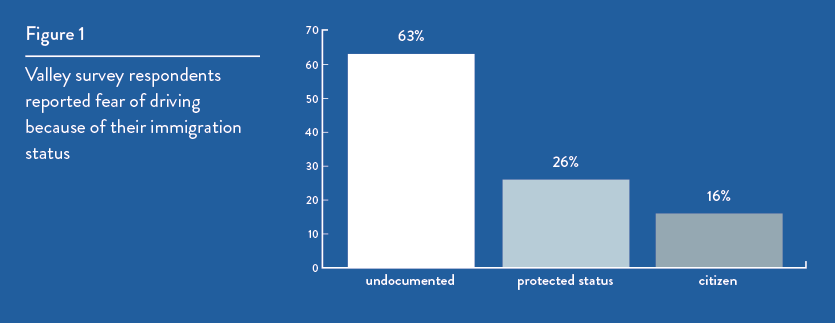
Border checkpoints in the Rio Grande Valley further complicate the picture in a way that is specific to border regions. These checkpoints have caused families to miss out on a range of activities, including life-saving specialty care for their children. A medical provider describes how parents are forced to make an impossible choice of forgoing treatment for their children because they would have to drive through a checkpoint to access care:
Sometimes the kids that are born here, sometimes they need to go to San Antonio, Houston, one of the cancer centers. . . . But the parents aren’t allowed to go. . . . They are denied access to cross the checkpoint. Consequently the kids don’t get the treatment they need. We don’t have a lot of specialty down here.
The following sections of this report detail the variety of ways that fear of familial separation — or experiencing one or multiple separations — can affect health and well-being.
Fears of Deportation and Forced Family Separation Harm Child Health
My oldest son is the one who knows the most, he is 13 and sometimes tells me, “Don’t go out anymore, don’t go because . . . ” and I tell him that I have to go for things like groceries, but he still says, “Don’t go,” because if they get me what will they do and who will take care of them and everything. I tell him I have to go out anyways, but it really does affect them and it affects us too.
Studies report that immigrant children — regardless of their legal status or their parents’ status — express fear that they may be separated from parents and families by immigration-related arrest.33 Our focus group participants reported experiencing daily fear of potential family deportation and the sudden disappearance of family members.
For many children those fears have been realized. We estimate that approximately 1,800 US-born kids in the Rio Grande Valley had a parent deported by immigration officials in fiscal year 2017.
Survey Snapshot: Children fear their parents getting deported
Our survey asked whether the respondent’s child feared their parents getting deported. More than one-half of undocumented parents (n=36) reported that their child feared that their parents might get deported, compared to less than one-fifth of parents with protected or citizen status (n=9).
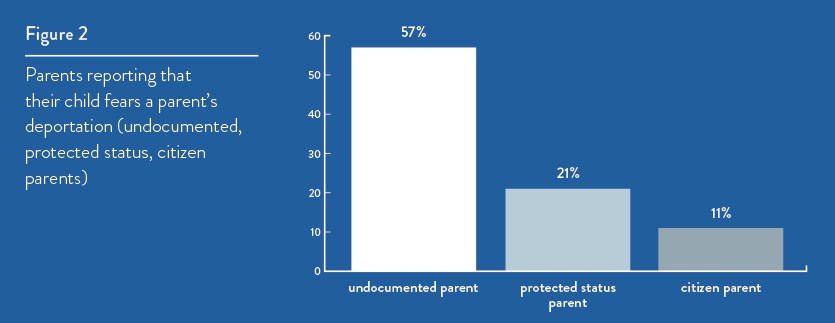
Parents hold deep fear for children with disabilities, delays, or life-threatening conditions
Among children who may be particularly affected are those living with disabilities, developmental delays, or life-threatening conditions — children who may rely on their undocumented parents to support basic life-sustaining activities like eating.33 Their parents and caretakers may live with a particularly acute sense of fear about how their children will be cared for should the parents be detained or deported, fearful of any activities that may put them on the radar of immigration officials.
Si si afecta, como yo soy la unica que mi esposo es ciudadano y mis hijos también son ciudadanos — pero yo lo siento mas por que tengo a mi niña que está discapacitada, ella tiene un retraso mental. Una vez que me pesco inmigración estuve tres días y esos tres días estuve llorando por que mi niña y pues si se que esta mi suegra pero no es como madre cuidando a su hija. Si me llegan a pescar, yo se que sin la mama en el hogar todo se viene abajo y no quisiera que me pasara eso.
I am the only one [who is undocumented] as my husband and children are documented. But I feel it more because I have my daughter who is disabled, she has a mental delay. One time immigration got me and I was [detained] 3 days and those 3 days I was crying for my daughter. My mother-in-law is around, but it’s not the same as a mom taking care of her daughter.
Threat of Parental Deportation Is a Toxic Stressor
You never know when ICE is going to come and take people. . . . And even though we’re protected, my brother and I with DACA, we know that even if we just . . . do a 5-second stop [while driving] we’re going to get deported. So we live in fear.
The fear of a parent or family member being deported affects a child’s emotional health both immediately and far into the future.34, 35 In a 2010 study, almost half of Latinx immigrant parents said the threat of deportation affected their child’s emotional and mental well-being.36 Research describes how fears can manifest in many ways, including stress.
Survey Snapshot: Stress
In our survey, a greater number of undocumented parents reported stress among their children under age 18 because of policies targeting a parent’s immigration status compared to parents with protected status and documented parents.
Specifically, over one-fourth of undocumented parents (n=18) reported that their child experienced stress because of a parent’s immigration status, compared to about one-tenth among parents with protected status (n=3) and less than one-tenth among citizen parents (n=2).
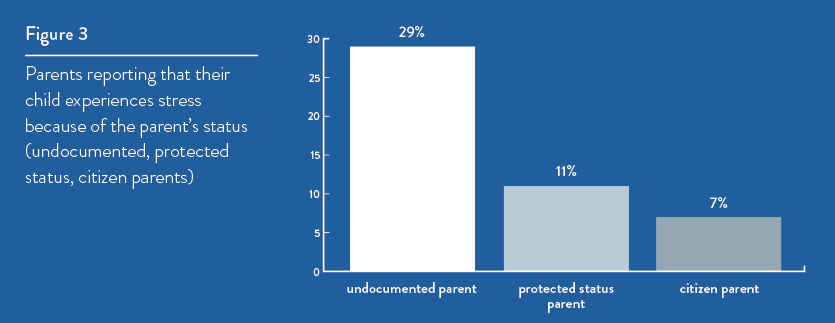
Stress Threatens Long-Term Health
Distinguishing different kinds of stressors
Children and families in the Rio Grande Valley experience multiple and heightened levels of stress that can impact their health and well-being in the short term and in the long run. Racism, discrimination, fear of separation and deportation, and actualization of these events are examples of sources of stress.
A growing body of public health research describes how experiencing discrimination or racism — what are known in the field as social determinants of health — links to stress and ultimately harms health and creates health inequities.37, 38 Increasingly, research also finds that discrimination and stress at certain ages, such as among young children and youth who are still developing, can be more harmful than if a person experiences stress at other times later in the course of their life.37
Toxic stress is particularly harmful to children’s lifelong health and development
Many children experience difficult situations in life that can lead them to feel sad, lonely, and scared. These feelings are typical reactions to life’s stressors. However, what is known as toxic stress is different from the more conventional, everyday stress, and threatens long-term health. Experiencing severe, prolonged adversity without adult support can lead to toxic stress.2 When children are in a state of toxic stress their brains and bodies are continuously focused on immediate survival at the expense of other development and growth.39 Toxic stress changes the biology of a child’s brain, including areas of the brain that deal with aspects like attachment or fear, and does so in ways that cannot necessarily be repaired.2 Children who live in a climate of discrimination, racism, separation, and deportation are especially at risk for the effects of toxic stress.
A growing body of research finds that the threat of a parent’s detention or deportation is a toxic stressor.35 Knowing that a parent can be or is absent removes the child’s buffering system, which can make it harder for the child to cope and challenges their regulation. Decades of research shows that children who experience separation from a parent are at greater risk of poor health outcomes over the course of their lives, ranging from asthma or trouble sleeping to impacts on their ability to learn and adapt to stressful situations.2
Research shows that sensitive and responsive caregiving and other trauma-informed interventions can buffer the effects of toxic stress, helping to mitigate the physical and emotional toll of traumatic and disruptive events.2, 40 Even so, the most health-promoting approach to protecting a child’s health is to keep families together and to reduce forced family separations.
Stress can affect a child even before they’re born
Stress caused by the threat of detention or deportation also has effects for children who have not yet been born. Following a large workplace raid in Iowa, babies born to Latinx mothers had a 24% greater risk of low birthweight after the raid compared with a year earlier, according to a study published in 2017.41 The risk was found in both US-born and immigrant Latinx mothers, but was not found in their White counterparts.41 Researchers describe that the stress surrounding immigration status can shift the hormones in a mother’s body, triggering premature birth or low birthweight babies who were full term.42 Low birthweight is important to children’s health because it is associated with worse adult health, educational attainment, and earnings.43
Stress harms health in adults
Most adults have sufficient resources to manage their stress, and a stressful situation is typically a short-term experience. On the other hand, chronic or unresolved stress in adults can damage health. This happens when stressful situations consistently overwhelm a person’s ability to cope — particularly when a person feels they have little control over these situations.44
Chronic stress can lead adults to adopt behaviors that compromise their health, and can directly affect their body functioning.44 After sustained stress, people’s bodies can lose the ability to turn off the physical stress response, leading to “wear and tear” on the body’s systems and organs.44
More specifically, stress affects the levels of certain hormones in the body, such as cortisol and adrenaline.45 High levels of these stress hormones can help in the short term, preparing the body for a “fight or flight” response. However, experiencing high, sustained levels of these hormones can lead to problems over a person’s life, such as high blood pressure, heart disease, or stroke. This kind of stress also interrupts the immune system, increasing people’s risk for cancer and other chronic illnesses and increasing the risk for obesity, diabetes, and their serious health complications or exacerbating them in people already living with the conditions.
Stress Can Lead to Symptoms of Anxiety and Withdrawal
Research describes how fears can manifest in many ways, including through mental health issues such as anxiety and depression and accompanying behavioral changes and psychosomatic symptoms, such as withdrawal and anger, problems sleeping and eating, or headaches and stomachaches.35, 32, 46, 47 Many of these same types of health consequences are also experienced by children whose parents have been detained or deported.
In a 2015 study, children with a deported parent were significantly more likely to show internalizing problems (such as anxiety or depression) and externalizing problems (such as aggression) than children whose parents were not deported or were in the process of deportation.48
We estimate that each year, approximately 800 US-born kids in the Rio Grande Valley will demonstrate signs of withdrawal, if deportations remain at current levels.*
* See Appendix D for background on calculation.
Survey Snapshot: Anxiety
In the current political climate, pediatricians describe seeing more anxiety and panic attacks among children in immigrant families who are afraid that their parents may be deported.49
In our survey, one-fifth of undocumented parents (n=13) reported anxiety among their children because of a parent’s immigration status, compared to about one-tenth among parents with protected status (n=3) and one-tenth among citizen parents (n=3).
The actual absence of a parent further disrupts the family context and relationships for a child. Psychologists have found that following immigration-related arrests there is a “pervasive sense of insecurity and anxiety,” which a 2010 Urban Institute study found led to mental health conditions such as separation anxiety, attachment disorder, and symptoms of post-traumatic stress disorder.50 More than two-thirds of children ages 12 to 17 showed signs of withdrawal or detachment from other people 6 months after authorities arrested their parent for immigration reasons, according to the same study.50
Survey Snapshot: Symptoms of separation anxiety
Using a tool to measure symptoms of separation anxiety in children, we found that among parent respondents with children under age 18, half of undocumented parents (n=16) reported that a child experienced symptoms of separation anxiety, compared to almost one-third of parents with protected status (n=3) and one-fifth of citizen parents (n=2).
These symptoms could include the following, based on the survey:51
- Getting scared sleeping away from home
- Following a parent wherever they go
- Worrying about sleeping alone
- Worrying or having nightmares about something bad happening to a parent or to themselves
- Fear of being home alone
- Not wanting to be away from family
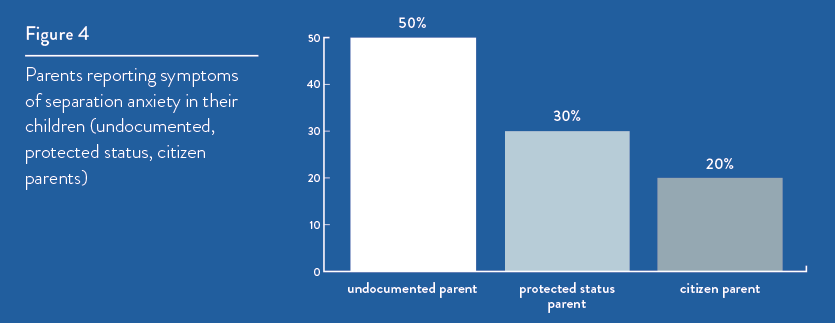
Research finds that children of undocumented parents show significantly higher risks than children of protected status parents of internalizing behavioral problems like anxiety, depression, low self-esteem, withdrawal, or a need for attention. They also show externalizing behavior problems such as rule breaking and displays of irritability and aggression.48, 52
One participant in our focus groups echoed these impacts, describing the anxiety and effects to her son’s health after a State Trooper questioned her immigration status during a traffic stop:
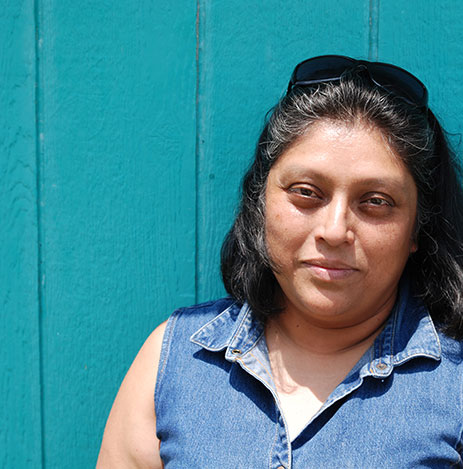
Ninfa, Rio Grande Valley resident, mother of 2
The length and timing of a separation in a child’s life matters, too. In the Urban Institute study, children who were separated from their parents and did not see them within a month had more behavioral changes than children who were reunited earlier with their parents.50 Research finds that the longer a parent is detained, the worse the family does economically, psychologically, and socially — and the higher the possibility of worse developmental outcomes in citizen children.9 Moreover, the timing of the separation in a child’s life matters. In one study, separation for as short as a week within a child’s first 2 years of life was related to higher levels of child negativity and aggression.53
Family Separation Is a Potentially Traumatic Event for Youth
Forced parent-child separation and parental loss are known as potentially traumatic events that harm child mental health and academic success.54 Potentially traumatic events can lead to post-traumatic stress disorder or PTSD, which is debilitating to a child’s development and ability to function and is a costly public health issue.54 In a recent study, researchers found that citizen children in mixed-status families whose parents had been detained or deported “experience more psychological distress and trauma compared to peers whose parents had no involvement with immigration enforcement” as well as “[h]igher levels of parent-reported PTSD symptoms.”54 In addition, children who experience multiple risks during childhood — for example, family disruption, growing up struggling to make ends meet, and parents who have particularly high stress — experience behavior problems in adolescence.55
Survey Snapshot: Symptoms of PTSD
In our survey, the percentage of parents who reported that their children had symptoms of PTSD did not vary greatly with the parent’s citizenship status. Among all survey respondents who answered this particular question, we found that 19% (n=11) reported symptoms of PTSD among their children.* There was not much variation across our categories of immigration status. By comparison, one study found that 5% of children ages 13–18 in the US have a lifetime prevalence of PTSD.56
* In keeping with how the original tool was developed and validated, we limited these results to parents who reported children ages 6–17.
In our survey, symptoms of PTSD could include:57
- Strong feelings in their body when they remember something that happened
- Staying away from people or places that remind them of something that happened
- Trouble feeling happy
- Trouble sleeping
- Difficulty concentrating
- Feeling alone and not close to people around them
Our findings differ from similar research on symptoms of PTSD in children of immigrants. Previous research suggests that children of parents involved in the immigration system experience more symptoms of PTSD than children whose parents are not involved in the immigration system — whereas our survey findings found similar levels of reported symptoms of PTSD in children of citizens and immigrants alike. This could be due to our sampling approach: the people who took the survey may be dealing with other stressors outside the scope of this study unrelated to their immigration status. Additionally, recent research has found that the health of the Latinx population on the whole is affected by anti-immigration policies — regardless of an individual’s immigration status. This can manifest as stress stemming from structural racism, and the effects that anti-immigrant policies have on access to education, health care, housing, and other social determinants of health.58
Unique health effects to people with DACA status or undocumented children
Research has found that there can be particular health effects for the many children who, although raised in the United States, experience uncertainty with their own status. For example, one study describes how Joaquin Luna Jr., an undocumented Mission, Texas, student, took his life as a result of the stress and despair he experienced because he felt his immigration status barred him from achieving his dream of going to college.60
In addition to its effect on health, the absence of a parent through separation can also affect a child’s long-term sense of identity. As researcher Joanna Dreby writes, “In the most severe cases, a child’s family may be permanently disrupted when a parent, typically a father, is deported. More frequently, however, deportation tactics have more subtle consequences for a great number of young children who, fearing illegality, begin to dissociate with their immigrant heritage and identity.”59
Fear Hinders Healthy Behaviors
Families are afraid to leave their homes and encounter immigration enforcement agents, leading them to dramatically change their daily routines.61 More reports are finding that parents may not feel safe taking their children to child care, hospitals, and grocery stores or allowing their children to do health-supportive activities like getting physical activity outdoors.61
Research shows that access to early education, medical care, and nutritious foods is critical to promoting good health, particularly in early childhood.61 Delaying doctors’ visits or not getting enough healthy food may lead to greater health and developmental problems later on.61
Survey Snapshot: Physical activity and eating
According to parents in our survey, children are missing outdoor physical activity or not eating well because of the policies targeting their parents’ status. One-sixth of parents in mixed-status families (n=8) reported their child missed outdoor physical activity compared to 2% of parents of non-mixed-status families (n=1).
Immigration status also changes how well a child eats. In our survey, one-sixth of parents in mixed-status families also reported their child had not eaten well because of their immigration status (n=8), compared to 6% of parents in non-mixed-status families (n=3).
This could be because of access to healthy food. It could also be a behavioral change responding to the fear or experience of separation from family members. Focus group participants described how children in their families developed symptoms like isolation and lost appetite after a family member was deported:
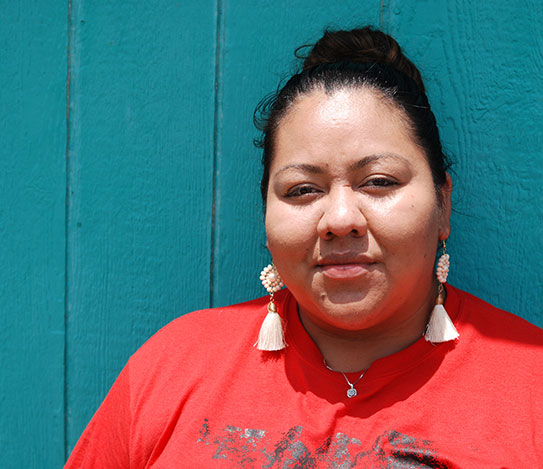
Agripina, Rio Grande Valley resident, aunt
Both of his parents got deported because of a minor traffic thing. . . . I saw overall that . . . academically he was going down, and he wouldn’t eat a lot. Sometimes when we would hang out he would say he got dizzy or something and I would ask, “What’s going on?” And he would say, “I didn’t eat today.”
Access to medical services — either for prevention or treatment — can be affected by parents’ coverage and willingness to use services. Children of undocumented parents are less likely to access important health care than children of citizen parents.62 Even when children are eligible for medical care, children of undocumented parents might not have access to health care and other public assistance.64, 65 This may be because of confusion about eligibility, fear and distrust of government institutions, language access issues, and difficulty completing applications.63, 65
A medical provider in the Rio Grande Valley interviewed for this report described barriers that can influence undocumented immigrants’ decisions to seek services for their children:
We come across a lot of people that don’t have any documents. . . . A lot of them tell me they are afraid to seek medical attention because they are afraid it’s going to hinder their citizenship. They are under the impression that if they’re sick in any way, or if they have any chronic illness, that’s going to count against them. That here in the United States they only want healthy immigrants.
Survey Snapshot: Health status and accessing medical care
In our survey, parents who had citizenship or protected status were more likely to report that their child’s health was very good or excellent, compared to parents who had undocumented status — 43% of undocumented parents (n=22) in our survey said their child’s health was very good or excellent, compared to 50% of parents who had protected status (n=11) and 60% of parents who were citizens (n=15). This mirrors other research findings, including a 2012 study that showed that slightly smaller proportions of US-citizen children with undocumented parents rated their health as very good or excellent compared to children of US-born parents.66 A 2017 study found that mixed-status families report worse physical health for their children compared to their US citizen counterparts, and that if a parent perceived their state to have unfavorable immigration policies, the differences in child health based on family type were further exacerbated.10
A greater proportion — almost one-third — of undocumented parents reported delaying care their child needed in the past year (n=14), compared to one-sixth of parents with protected status (n=3) and no documented parents (n=0). This is consistent with other reports finding families delay or forgo medical care for reasons that include fear of driving and encountering immigration officials.61
A child’s behavioral and developmental progress at a young age influences their ability to think, learn, speak, hear, and communicate — skills that affect educational outcomes later in life.
Fears of Deportation and Forced Family Separation Impact Kids’ School Success
On occasion, [youth will] tell me, “My mom got deported earlier this year” or “My mom is currently detained in ICE”. . . . You can tell that they can’t really focus on schoolwork at the level that they should be. . . . It’s pretty tough.
Success at school comes from more than being physically present. Threats to a child’s sense of safety, family, and living environment influence their ability to do well in school. Immigration stressors common in the Valley — deportations, fear of family separation, border checkpoints, and immigration politics — can affect a Rio Grande Valley student’s readiness to learn throughout the entire educational pipeline, from cradle to college. In the short term, these immigration-related stressors can impact school attendance, grades, and sense of safety at school. Long term, these stressors could cut a student’s educational aspirations short.
Education influences the potential for employment opportunities, life skills, and social connectedness — all of which are big predictors of health status as adults. Kids who do better in school have better health as teens and as adults. Education is an important lever in health promotion, as research suggests that individuals with higher levels of formal education can have a greater sense of control over their lives, as well as more social support — both indicators of improved health outcomes.67 Additionally, higher education is also associated with healthier behaviors, such as exercising more, drinking less alcohol, and not smoking.67, 68, 69
More education is also associated with better employment, income, and financial security at the individual level, which can translate into economic benefits at the national level.67
I’ve had some cases, in regards to some families being deported . . . dealing with that . . . with the little trauma of the boys and girls saying, “What do I do now? Where’s my mom? Where’s my dad?” or “They took my mom” or “They took my dad.” That’s been a little bit challenging for us this year.
Difficulty Keeping Up Grades and Going to School
He has this fear and anxiety that has affected his health and is affecting his schooling so much that we think he’s going to have to repeat this year at school. He’s a smart kid, he’s in the [gifted and talented] program and attending programs at the university along with middle school, so he’s going to lose access to those programs and have to start at zero. . . . He’s too young to be dealing with this.
A child’s academic performance can suffer after the detention or deportation of a caregiver. Immigration policies can create a climate of fear that affects children’s academic performance, even if their family is not directly impacted by detention and deportation. In a 2010 study, the majority of immigrant parents (63%) reported that the threat of detention and deportation affected their children’s school performance.36
We found evidence of this in our focus groups, through stories about youth who experienced radical changes in their attitudes toward school after the deportation of a loved one. Youth who had experienced parental separation (or were exposed to an immigration stressor that made them fear being separated) exhibited declines in their school readiness. Children who were once eager to learn now didn’t want to go to school, and their grades began to suffer. One mother shared the story of her son who was so stressed about the possibility of his mother being deported that it became harder for him to keep up with his schoolwork, and he now faced being held back from progressing to the next grade level.
Survey Snapshot: School avoidance anxiety and school readiness factors
Our survey asked Valley residents about their child’s school readiness factors, and whether or not parents had observed changes in their child related to the parent’s immigration status. Our survey found that 40% of undocumented parents had a child who was exhibiting symptoms of school avoidance anxiety (n=13), compared to almost one-third with protected status (n=3) and one-fifth among citizen parents (n=2).*
* In keeping with how the original tool was developed and validated, we limited these results to parents who reported children ages 8–18.
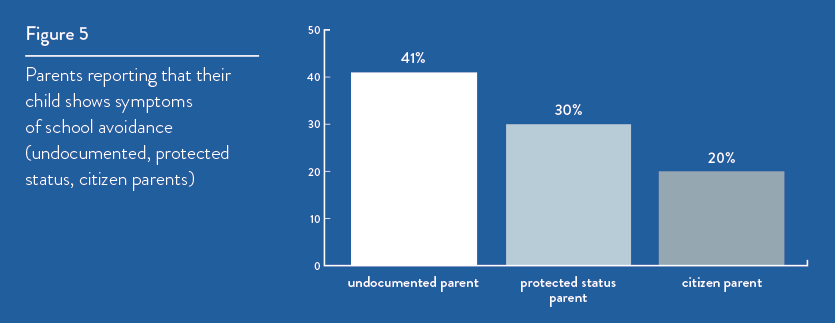
Our survey also found that because of policies targeting a parent’s immigration status:
- Almost one-fifth of undocumented parents reported that their child had fear about going to school (n=11), compared to one-tenth among parents with protected status (n=3) and 4% among citizen parents (n=1).
- Almost one-fourth of undocumented parents reported that their child had trouble focusing on schoolwork (n=14), compared to one-tenth among parents with protected status (n=3) and 4% among citizen parents (n=1).
- One-fifth of undocumented parents reported that their child had missed days of school (n=12), compared to no parents with protected status (n=0) and 4% among citizen parents (n=1).
- Almost one-fourth of undocumented parents reported that their child had trouble keeping up grades (n=14), compared to 4% of protected status parents (n=1) and 0% of citizen parents (n=0).
Survey Snapshot: Instances of school staff contributing to anti-immigrant climate
During our data collection in the Rio Grande Valley, we heard of a few instances in Rio Grande Valley elementary schools and colleges where students were discriminated against for being Latinx or “Hispanic.” While not the exact focus of our investigation, we want to acknowledge how the political climate is impacting some youth in the Rio Grande Valley. One mother reported that her child was asked to leave the classroom because the teacher didn’t teach “Hispanics.” Others discussed rising fears over racism amid current politics.
In our survey, we found that 14% of undocumented parents reported that their child experienced discrimination at school due to the parent’s immigration status (n=9), compared to 4% of parents with protected status (n=1) and 4% of citizen parents (n=1). Experiencing discrimination has been found to have long-term adverse health effects, and there is some evidence to support creating more equitable policies as a means to confront and dissolve these experiences.
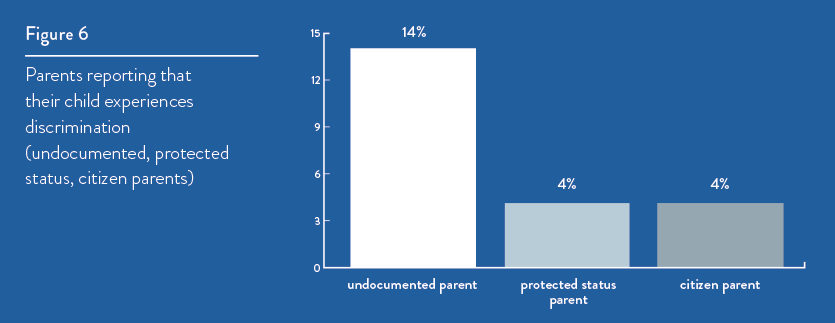
Challenges to Pursuing a Higher Education
For me it is kind of scary, because being the oldest one with papers, if anything were to happen . . . I would have to look after my siblings. That’s hard because I am barely ready to start college and I am not even stable enough for myself so it would be hard to look after my 4 other siblings.
Students that are undocumented, they’ll question, “Am I able to go to school?”
Youth in the Valley are focused on pursuing a higher education — and many are on that track, as 90% percent of Valley high schoolers graduate from high school within 4 years. The region’s graduation rate rises when 5-year and 6-year graduates are included. This is higher than the Texas average, and it’s driven by community values around education. The collaborative known as RGV Focus is an example of these values. Formed in 2012, the coalition consists of “leaders from the education, nonprofit, community, workforce and civic sectors”70 all dedicated to college readiness for the youth of the Rio Grande Valley.
But even the most dedicated students face barriers to pursuing college. Some Valley students face higher costs to attend college since they are ineligible for scholarships and financial aid because they are DACA or undocumented — causing some to lose hope of attending college, and to withdraw from their focus on high school. For those who pursue a college education, they often find out the high costs of enrolling in college courses forces them to work extra hours to pay for their classes — which comes at a cost to their ability to complete their coursework, slowing their progress toward their goals.
Border checkpoints are also physically isolating youth from educational opportunities. Educational leaders and focus group participants described how they, or family members, are unable to drive past immigration checkpoints that surround the Rio Grande Valley. These checkpoints impede access to educational opportunities for youth. While some Valley youth are accepted at top-tier schools around the country and in the state of Texas, they often cannot even visit the school because their identification isn’t acceptable for border checkpoint passage. Some end up not attending because they are unable to pass through the checkpoints.
Schools Uplift Students When They Promote Stability and Equity in Education
Our mission is to serve every child who lives in the community, regardless of their documentation status.
Research has found that schools can provide stability for youth affected by immigration stressors. In a study on the effect of immigration raids on academic performance, researchers found that while 1 in 5 children had difficulty keeping up with their grades immediately following raids, overall, schools offered key stability and support for children whose parents had been arrested in the raids.50
Educators and community members in the Rio Grande Valley are going above and beyond to serve their students and to see them succeed. The Valley is home to schools that outperform higher-income school districts, and some schools and school districts are leading the nation with innovative programs they’ve developed to ensure students are graduating — including intensive drop-out recovery programs, National Blue Ribbon School awards and nominations, credit recovery academies, and community collaborations.
Even with all these programs, the trauma of a parental deportation still permeates a child’s educational experience. Deporting a student interrupts or potentially ends their schooling, and the deportation of a parent can affect a child’s ability to participate fully in their learning.
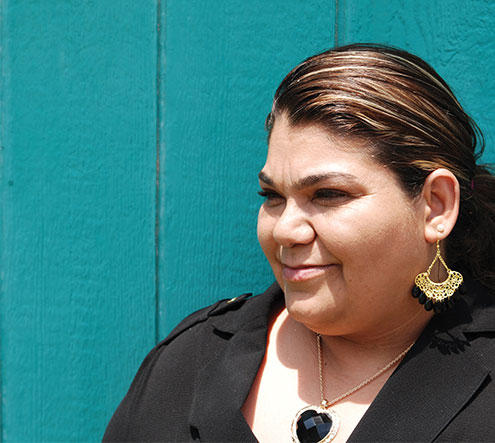
Lourdes, Rio Grande Valley mother of 3
Fears of Deportation and Forced Family Separation Harm Adult Health
It affects me also. I have a son who is the youngest and the only one born here. So it’s been said a lot that if I get deported they would take him from me because he is from here and you go crazy just thinking that you might leave a child here, abandoned. . . . Thinking about that is very stressful and all that thinking can make you sick and for me all that stress gives me migraines.
Pues a mi tambien me afecta, yo tengo un hijo el mas chico que es de aqui nadamas el. El es el único que tiene papeles y pues se ha dicho mucho que si nos vayan agarrar y a mi me deportan que a él me lo van a quitar porque el es de aqui y pues uno se vuelve loca nadamas de pensar que vas a dejar aquí un hijo como quien dice abandonado por que yo no me siento agusto dejandoselo a otra persona y pues no tengo familiares aquí, con papeles no tengo pero si que estan igual que nosotros. …y pues es muy estresante y te enfermas de tanto estar pensando y yo ahorita de tanto estrés padezco migraña de tanto estar pensando de mi hijo si nos agarran, que mi esposo se va al trabajo si no regresa, y pues uno se tiene que aguantar todo eso y pues te enfermas de tanto estar pensando, y pues si me afecta bastante.
A broad range of economic, social, societal, and environmental factors intersect and play out in community, family, and personal spaces to shape health. This section describes how adult health often is interwoven with child and family health, particularly when talking about immigration policy. It also describes how the ability to meet a family’s basic needs, adult physical and mental health status, health habits, and access to and use of medical care play out in the context of immigration policies in the Rio Grande Valley.
Adult Health Is Connected to Child and Family Well-Being
Research finds that adult and child health are interwoven when it comes to immigration status. In one study, the greater the legal vulnerability of the parent, the greater the reported impact of detention and deportation on what study authors called the family environment, which includes perceptions of parents’ emotional well-being, perceived ability to provide financially for the family, and the parent-child relationship, as well as child well-being.36
One focus group participant articulated the inter-relatedness of child and adult health, and how the possibility of detention or deportation creates an uncertainty that affects them and their families:
There is a very emotional imbalance in every one of our families. . . . The kids just live with it and start their families and this just adds to the stress on the parents because they now have daughters- or sons-in-law to worry about too, and grandchildren. So the worry becomes even more stressful, and the danger they are in even greater because it’s not just your kids in danger, it’s your grandkids. So then that piles on your health too in the form of headaches, trauma, stress, never having any peace or tranquility in your home because you are always preoccupied with what will happen next. The worry also of always telling your kids, “Never run a red light even by accident,” “If someone says something to you don’t answer them” . . . so many things. And you pass that stress onto them too.
. . . It harms me directly and indirectly, like we see with everyone it affects all of us but all of us differently. . . . I am not documented and neither are my kids so how does it affect my health? Just from the stress every time your child goes out or goes to work. . . . I have 2 kids with DACA but they are also in limbo because they don’t know if it will be cancelled or not, so nothing is certain and it really is a huge amount of stress. Not just that, I feel like we are part of really strong, defined families and that’s why it hurts so much — in taking away one member of the family it moves everybody because we are united and if you take away a child the parents go too, and you drag the other kids along with you. We are not part of disjointed families, our families are integrated, whole. . . . We are all in this limbo where nothing is certain.
Meeting Basic Family Needs Can Become Impossible
Youth in our focus groups described constant fear of a domino effect on their health due to separation from a family member.
My parents, they bring the money to the house. I help them as well, but it’s a domino effect. If they fall, we fall too. I’m 100% sure I wouldn’t be able to sustain myself if my parents were to leave, and I can’t imagine my life without my little brother — he’s everything to me. . . . You never know if you’re going to wake up the next day and if you’ll get through the day with your whole family being together. And that’s pretty scary.
Often deportation removes a main — or sole — source of income from a household and family, exacerbating economic issues for families that may already struggle to make ends meet.50 In one study, households had their income cut in half and one-quarter of households were left with zero income after someone in their home was deported.50 A 2010 study found that more than half of Latinx parents in mixed-status families had challenges providing for their children due to the threat of detention and deportation.36 Deportation overwhelmingly creates single-mother households, which, unlike when a partner is laid off or hurt on a job, cannot rely on unemployment or worker’s compensation.50
We estimate that each year, 500 US-born children in the Rio Grande Valley have health status that is less than “excellent” or “very good” after the income in their household changes once a primary earner is deported.*
* See Appendix D for background on calculation.
Fear Has Impacts on Individual Health and Population Health
Studies on immigration policy and health status find that the pervasive fear of deportation affects both mental and physical health for adults — parallel to the effects to children described in earlier sections of this report.
Importantly, this fear isn’t limited to undocumented parents — it affects parents with different forms of non-citizen status. A 2018 study found that permanent residents, people with temporary protected status, and undocumented parents reported significantly more psychological distress from immigration than US citizens.71 Another study published in 2018 found that among Latinx participants, knowing 1–2 deportees increased the odds of needing help for emotional or mental health problems by 45% compared to not personally knowing any deportees.72 Results were even more dramatic for people who personally knew 3 or more deportees, finding they were 4 times as likely as someone who didn’t personally know any deportees to need help for emotional or mental health problems such as feeling anxious, sad, or nervous.72
In a 2010 study, fear of deportation (not English proficiency, legal status, or other related factors) was the strongest predictor of stress among undocumented immigrants.73 The fear of deportation is important to adult health because it exacerbates chronic diseases such as depression, high blood pressure, and anxiety while producing a range of physical symptoms, such as hair loss or headaches in parents.74 Research finds that poor health increases with people’s fears of being deported, and that undocumented immigrants reported more stress — almost one-fourth more — from economic and job-related challenges than documented immigrants.75
Self-rated health — a validated measure that correlates well with actual health76 — varies between people who fear deportation and those who don’t. A study that compared Latinx immigrants who were concerned about deportation to Latinx immigrants who weren’t concerned found that 2 times as many people who were concerned rated their own health “poor” (9% vs. 4%). More people who were concerned rated their health “average” compared to people who were unconcerned about deportation (32% vs. 24%), with the balance of each rating it “good” or “reasonably good.”75
Survey Snapshot: Adult health status
In our survey, more than half of undocumented respondents said their own health was poor or fair (n=47), versus 41% among people with protected status (n=22) and 32% among citizens (n=17). By comparison, in 2017 25% of the Latinx population in the US reported fair or poor health.77
Managing particular health conditions that stress can exacerbate and that require constant attention can be challenging for immigrants, as one focus group participant described:
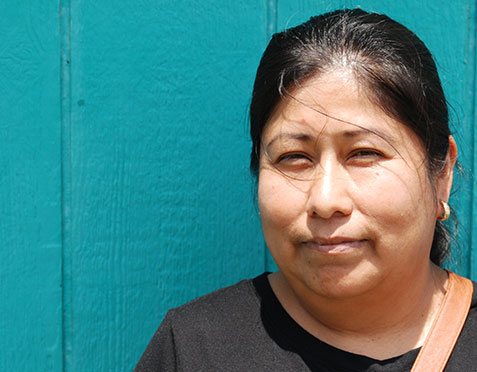
Elsa, Rio Grande Valley resident, mother of 3 DACA youth
Survey Snapshot: Adult symptoms of anxiety
Our survey also measured how many respondents reported symptoms of Generalized Anxiety Disorder. Responses indicated that someone had either no symptoms or symptoms of mild, moderate, or severe anxiety. We found that greater proportions of undocumented respondents had symptoms of moderate and severe anxiety than people with protected or documented status. For moderate anxiety, 19% of undocumented respondents reported symptoms (n=17), compared with 8% of protected respondents (n=5) and 15% of respondents with citizen status (n=8). For severe anxiety, 14% of undocumented respondents reported symptoms (n=13), compared with 10% of protected respondents (n=6) and 7% of respondents with citizen status (n=4).
Adults with undocumented status who responded to our survey said that the threat of detention and deportation harmed their mental health. For example, three-fifths of people with undocumented status said that because of their status they feel stress (n=55), over three-quarters worry that their family will be separated (n=71), and half have anxiety about their family’s health (n=46). Among people with protected status, 34% felt stress (n=21), 32% reported worrying about family separation (n=20), and 29% had anxiety about family health (n=18). Among respondents with citizen status, the figures were 30% for stress (n=17), 28% for worry about family separation (n=16), and 21% for anxiety about family health (n=12).
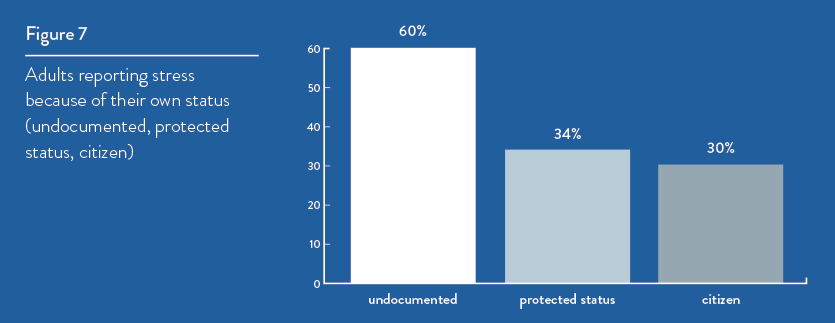
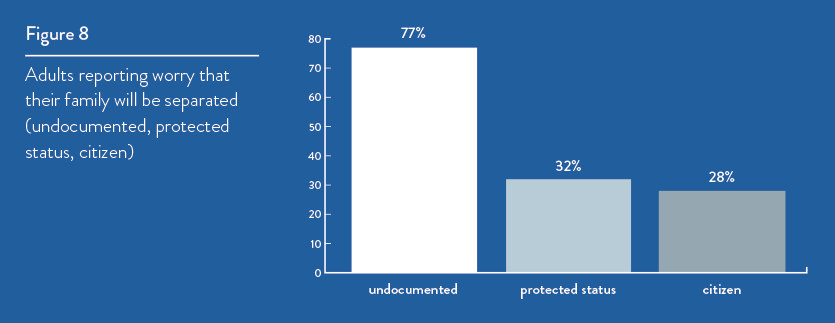
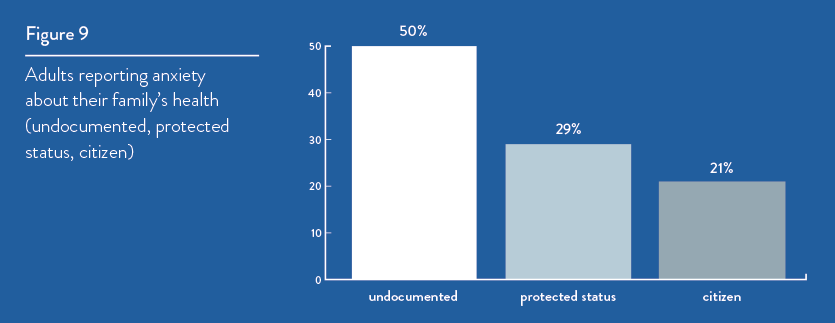
Thirty-nine percent of undocumented respondents were less willing to report a crime (n=36), compared to 26% among protected status immigrants (n=16) and 16% among documented individuals (n=9). More than two-fifths of undocumented respondents reported feelings of racial profiling (n=39), which was double the rate of people with protected status (n=13) and citizens (n=12), 21%. While these are not direct measures of health or mental status, they reflect an overall perception that could contribute to heightened anxiety, which in turn would impact physical and mental health over the long term.
Survey Snapshot: Physical activity and eating among adults
In our survey, a larger proportion of undocumented adult respondents, 28%, reported difficulty exercising because of their undocumented status (n=26), compared to 23% of respondents with protected status (n=14) and 14% of citizens (n=8). Similar gradients in proportions are seen in people who reported difficulty buying food, with 27% of undocumented people (n=25) reporting it, compared to 24% of people with protected status (n=15) and 16% of citizens (n=9). These experiences are echoed in qualitative research that describes how undocumented populations attempt to remain invisible in public spaces out of fear of deportation.78, 79
Fear and Cost Barriers to Medical Care That Affect Community Health
Living under the persistent threat of deportation, undocumented immigrants face direct barriers in accessing medical care, such as high costs of care or ineligibility for Medicaid.
One focus group participant described:
The reality is that even if we feel really sick we don’t go to the doctor unless it’s an emergency because we know that if we’re stressed now we will come out even more stressed because we know how much it’s going to cost.
One study across 5 sites in California, Florida, Illinois, South Carolina, and Texas found that after a parent’s detention or deportation, families were more likely to face economic hardship and less likely to use social support services, even for children who are US citizens.80 Reasons for using fewer services — such as emergency food or linguistically appropriate mental health support for children amid separation from a parent — included too few services available or services available on a temporary basis but not to meet long-term need, as well as fear of interacting with officials or fear of driving to reach services.80
There are also indirect barriers that result in immigrants less often seeking care, such as what is known in public health as a chilling effect. This describes when a climate of fear makes people less likely to use services for which they qualify.
For example, research has found less use of prenatal care and HIV care in Arizona around the passage of SB 1070, one of the broadest and strictest anti-immigrant bills passed in recent years.78 A separate study found that Latinx citizens “are less likely to make an appointment to see a healthcare provider when the issue of immigration is mentioned.”81
Having health insurance and a regular place to receive health care are crucial in protecting and improving the health of undocumented immigrants. In a nationwide study, people who had both health insurance and a usual source of care were more likely to get preventive services, like a physical checkup or blood pressure test, compared to people who had neither.82

Glady, Rio Grande Valley resident, mother
Research paints a picture of undocumented immigrants with diminished access to health insurance and use of medical services. For example, more than half of adult undocumented immigrants do not have health insurance, a proportion much higher than documented immigrants or US-born populations. In 2017, 39% of undocumented immigrants were uninsured, compared to 17% of lawfully permanent residents and 9% of US-born and naturalized citizens.83 A 2007 study conducted in California prior to the passage of the Affordable Care Act found that a significantly lower percentage of undocumented Mexicans (66%) and other Latinx people (62%) in the state had a usual source of care compared to US-born White people (93%).84 It also found that undocumented Mexican people in the state had 1.6 fewer physician visits and undocumented Latinx people had 2.1 fewer physician visits compared to their native-born counterparts within the last year.84
Survey Snapshot: Access to medical care
In our survey, over half of people with undocumented status reported difficulty getting medical care (n=53) compared to less than one-third of people with protected status (n=19) and 12% of those with citizenship (n=7).
One person in Rio Grande Valley whom we interviewed described:
There are times when many people who don’t have documentation . . . may not have enough to insure the car or the car has a broken light and that’s why they can’t go to the clinic for care because they are scared, right? . . . That’s why a lot of people, if they are sick, they don’t want to go to the doctor because they say, “No, I’ll get better soon,” like with homemade remedies and they don’t go out because they are also afraid to.”
Conclusion and Recommendations
In Texas, and across the nation, undocumented immigrants and their children experience real and measurable changes to their health, safety, and educational opportunities under continued policies of detention and deportation.
When a child is separated from one or more parents through detention or deportation — a tidal wave of effects is set in motion that continues through their childhood, development, and well into adulthood, raising the child’s risk of developing chronic health issues later in life.
As the Rio Grande Valley seeks a way forward to protect both the safety and health of residents in the wake of SB4, we recommend a path that puts family unity first. Building on a body of evidence on the impact of immigration policy on families and communities — with particular attention to the educational, behavioral, and mental health outcomes for children and adults — we hope to shine a light on the importance to public health of keeping families together, free of daily fear, and void of long-term consequences.
Solutions: Policies That Keep Kids and Families Together
We recommend an evidence-based approach of reducing unnecessary detainment and associated prolonged parent-child separation as a means to support the health of parents, families, and the entire Valley community.
Specifically, this can happen in the Rio Grande Valley in the following ways. Each of these recommendations is described in detail in the following sections:
- Prioritize local police resources toward local law enforcement issues instead of assisting immigration officials
- Increase use of “cite and release” practices during standard traffic stops
- Accept alternative forms of identification for traffic stop procedures
In addition, local policymakers and institutions can designate resources to support programs and interventions that have been shown to buffer the effects of toxic stress in children following separations when they do happen, and to support spaces like schools that have been shown to support children.
Recommendation #1: Prioritize local police resources toward local law enforcement issues instead of assisting immigration officials.
Make sure officers know that they are not required to enforce federal immigration law.
Local and state law enforcement have no authority to stop or arrest individuals based on immigration status or suspected civil immigration violations. While local police departments and the sheriff’s office may assist ICE and Border Patrol, local agencies should prioritize agency monies, equipment, and personnel for local purposes. This will help ensure local money is used on local law enforcement issues and that the trust between the community and local law enforcement is not eroded.
Policy suggestions:
- Adopt a written policy prioritizing local resources, including human resources, toward local needs, including ongoing cases and investigations, minimizing response times, ensuring the availability of officers and deputies for requests from Valley residents, and other business of the local police department or sheriff’s office.
- Develop a policy and procedure for complying with requests from ICE or Border Patrol for operational assistance, including approval by the sheriff or chief of police prior to complying with any request. Do this in coordination with a group that provides community perspective and input.
- Adopt a policy requiring officers, deputies, and personnel to provide detainees with notification of any requests from ICE to hold the individual or to notify ICE of that person’s release date.
- Adopt a process to legally evaluate immigration detainers and provide guidelines for when detainers will be honored or not. Immigration detainers (also known as ICE holds or immigration holds) are requests ICE issues to local law enforcement agencies, asking local officials to hold an individual an extra 48 business hours beyond when the individual would have been released normally.85 The policy should only allow detention of a person pursuant to an ICE request when doing so is consistent with the Fourth Amendment and ICE policies and practices.
Recommendation #2: Increase use of “cite and release” practices during standard traffic stops.
Police departments and sheriff’s offices can use their discretion under state law to cite and release. Increasing cite and release for certain offenses reduces the number of arrests and decreases over-incarceration in local jails. Traffic offenses such as driving without a license are one area in which to exercise discretion.
Directing local resources toward the enforcement of these offenses makes it difficult for local law enforcement to address more serious issues in the community. Other examples include using local law enforcement resources to target low-level offenders, including people who are living without a home or struggling to make ends meet, and people with mental illness or drug or alcohol addiction. Criminalizing these behaviors rather than supporting them with public health approaches usually fails to improve public health and safety, while also exposing communities of color to incarceration and immigrants to deportation. Localities have the power to decriminalize behaviors like these.
Local agencies should also develop and utilize diversion programs that allow all individuals, regardless of immigration status, to participate and that don’t require participants to plead guilty prior to entering the program.
Policy suggestions:
- Adopt a policy that clearly states police officers and deputies should not arrest individuals for minor traffic violations.
- Establish a cite and release policy for low-level offenses (all Class C misdemeanor citations, and the Class A and Class B misdemeanors set out in articles 14.06(c) and (d) of the Texas Code of Criminal Procedure), without regard for the person’s immigration status.86
Recommendation #3: Accept alternative forms of identification for traffic stop procedures.
Law enforcement officers encountering an unlicensed driver without a state-issued ID often inquire about citizenship status and in the Rio Grande Valley may call Border Patrol for assistance, where undocumented residents are then taken into custody for deportation proceedings. Such exposure can be avoided if local law enforcement officers accept other forms of identification for the purpose of ticketing drivers.
We recommend establishing a protocol for officers and deputies to evaluate and accept non-traditional forms of identification, rather than just government-issued IDs, for various purposes including traffic stops and in issuing civil citations.
Such forms of identification include but are not limited to student identification cards, driver’s licenses issued by the government of another country, consular ID cards and other identification documents issued by the government of another country, association membership cards such as the LUPE membership card, and bills/correspondence with the individual’s name and address.
Policy suggestions:
- Adopt a policy that clearly states police officers and deputies should not arrest individuals for driving without a license.
Additional recommendations beyond law enforcement
From a health lens, the most protective action is to stop family separations in the first place, as described in the recommendations above. Research finds that even if a family is ultimately reunited, the consequences of their forced family separation often remain.87 The American Psychological Association enumerates a number of recommendations from this perspective for national lawmakers, local jurisdictions, and neighborhood and community institutions and systems.87
If family separation does happen, however, research also finds that there are protective factors or assets for children of immigrants that buffer the risks associated with social exclusion and/or separation from a parent through detention or deportation.12
More specifically, authors have found that for US-citizen children of undocumented parents, access to child-specific social services — such as Medicaid for the child, WIC, SNAP (food stamps), and reduced-cost school lunch — and positive parent-child relationships can buffer risks.9
Positive relationships with family members, other adults, and peers facilitate healthy social and emotional growth for children, preventing poor behavioral outcomes. For example, research finds that healthy attachment and bonding with parents lays the foundation for a child’s sense of confidence and identity, leading to positive relationships with others.88 As the authors of a 2004 study on the subject suggested, “Perhaps the most powerful social resiliency factor for children is the quality of family life.”89
Policy suggestions from the American Psychological Association that also apply in particular to the issues raised in this report include:87
- Local jurisdictions should declare themselves as sanctuary cities to enhance the protection of undocumented immigrants and their families.
- Officials in charge of school budgets should invest in well-trained mental and behavioral health providers who are bilingual and bicultural to support students who have experienced trauma.
- Schools should invest in professional development for teachers and administrators on immigration policy, responsive and inclusive procedures and policies, and ways to elicit feedback from parents and students to improve school culture and climate.
- Institutions of higher education should be held accountable (regardless of public or private funding) to allow equitable access to all eligible students, regardless of status. Also, concerted efforts need to focus on teaching educators about creating learning environments that respect all students and provide equitable resources to support all students, regardless of their immigration status.
- Local medical, psychological, and caregiving providers should recommend how to design interventions that have been shown to buffer the effects of toxic stress in children, drawing from recommendations in the literature on what has been proven most effective.40